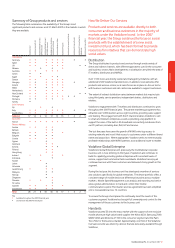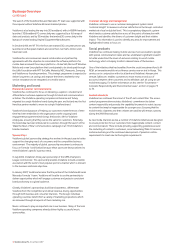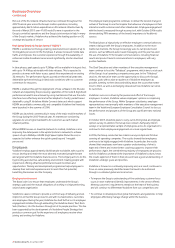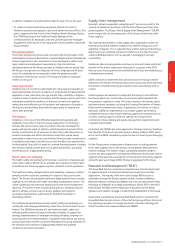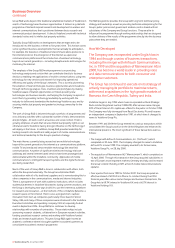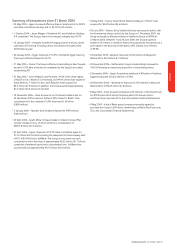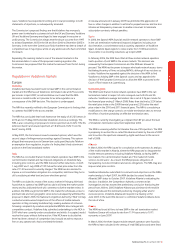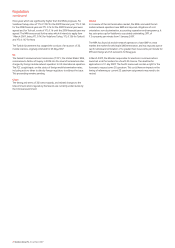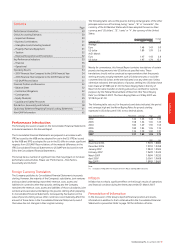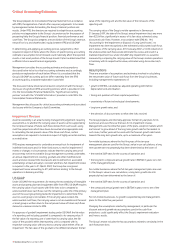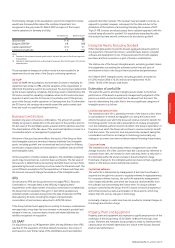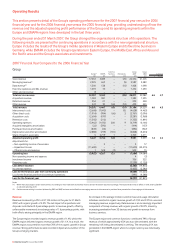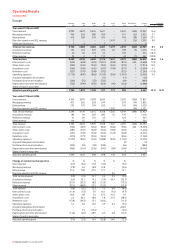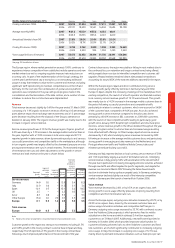Vodafone 2007 Annual Report Download - page 29
Download and view the complete annual report
Please find page 29 of the 2007 Vodafone annual report below. You can navigate through the pages in the report by either clicking on the pages listed below, or by using the keyword search tool below to find specific information within the annual report.
Vodafone Group Plc Annual Report 2007 27
From 1 April 2007, a new Access Deficit Charge (“ADC”) regime became
effective, which will result in a 38% reduction of the total ADC paid by
operators in the 2008 financial year. It is proposed that the ADC be removed
by the 2009 financial year.
In February 2007, the NRA set price controls on national roaming retail
tariffs, which will result in up to 56% reduction of tariffs. In December 2006,
the DoT rejected the NRA’s recommendation that mobile number
portability should be implemented.
The DoT is expected to announce its plans to allocate and license 3G and
WiMAX spectrum in 2007.
Kenya
In March 2006, the Kenyan Government issued a new Information and
Communications Bill for public comment. There have been no further
developments.
In February 2007, the NRA reduced Safaricom’s and Celtel’s mobile call
termination rates from Ksh 8.12 per minute to Ksh 6.28 per minute from
1 March 2007. This followed a previous reduction of Safaricom’s mobile call
termination rate from Ksh 10 per minute in October 2006. The NRA
undertook to carry out a review at the end of 2007 before introducing new
interconnection rates for January 2008. The NRA also imposed a Ksh 30 per
minute retail price cap that will be imposed on mobile off-net voice calls
from 1 July 2007.
In September 2006, Safaricom obtained a one year 3G trial licence.
New Zealand
The NRA released a report proposing regulation of mobile termination rates
for fixed to mobile calls, including a rate reduction of 44% from 27 New
Zealand cents per minute to 15 New Zealand cents per minute and
reducing further to 12 New Zealand cents per minute by the 2011 financial
year. These proposals were submitted to the Minister for approval, who
requested the NRA to reconsider them. The NRA did so and published a
further position in which its key findings remain essentially unchanged.
These were resubmitted to the Minister for reconsideration in the context of
new offers by the two mobile operators to reduce mobile termination rates
voluntarily and, where relevant, to pass through savings from reduced rates
to end users of fixed to mobile calling. The Minister decided to reject the
NRA decision in favour of the industry solution. The NRA is also
investigating regulation of national roaming and co-location and Vodafone
has tabled an undertaking for these services. Following feedback from the
NRA, Vodafone has tabled a revised undertaking which will be taken into
account by the NRA in producing its draft report.
During 2006, Vodafone New Zealand was successful in obtaining a
determination from the NRA in support of local interconnection services
with the fixed incumbent, Telecom New Zealand. Local and mobile number
portability was introduced on 1 April 2007.
The Government has determined the process for the renewal of 900 MHz
2G licences which expire in the 2012 financial year, ensuring that a quarter
of the spectrum passes into the hands of a new entrant. Although currently
used for 2G services this spectrum may be used for the provision of UMTS
services. The price to Vodafone for renewal of the remaining spectrum is yet
to be determined.
During 2006, the Government intervened to regulate local loop unbundling
and the operational separation of Telecom New Zealand.
Poland
The NRA, in its review of the call termination market, has found that all
mobile network operators (including Vodafone’s joint venture, Polkomtel)
have SMP and it has imposed obligations of cost orientation, transparency
and non-discrimination. In April 2007, the NRA issued a decision in which it
proposes to require Polkomtel to reduce its termination rate to 0.40 PLN in
May 2007 and to further reduce it in three annual steps to 0.2162 PLN by
May 2010.
Romania
The NRA in Romania is implementing market reviews as required by the EU
Framework following Romania’s entry to the EU in January 2007.
In its review of the call termination market, the NRA has proposed that all
mobile network operators have SMP and has imposed obligations of cost
orientation, non-discrimination and accounting separation. In September
2006, the NRA reduced termination rates to 7.21 eurocents. In January
2008, rates are to reduce to 6.40 eurocents and in January 2009 to
5.03 eurocents. Vodafone Romania has appealed this decision.
Regulations mandating the introduction of number portability were
adopted in March 2007.
The Romanian Competition Authority is investigating the termination rates
charged by Vodafone Romania to international carriers. If Vodafone
Romania is found to have infringed the competition law, it could be subject
to a fine.
South Africa
The Electronic Communications Act became effective in July 2006,
replacing previous telecommunications and broadcasting legislation. The
Act introduces a new licence regime, which all existing licences are required
to be converted prior to July 2007 but, to date, the NRA has not issued the
process by which this would occur.
An Information Communication Technologies Black Economic
Empowerment Sector Code (the “Sector Code”) is expected to be finalised
in 2007. The Sector Code will set targets to evaluate a company’s
contribution to Broad-Based Black Economic Empowerment, under which is
the Government policy to increase economic empowerment of historically
disadvantaged individuals in South Africa.
Separately, in January 2007, the NRA issued proposals to declare Vodacom,
MTN and Cell C as having SMP in the wholesale mobile call termination
market and the imposition of regulation, including LRIC-based (Long Run
Average Incremental Cost) price controls, on Vodacom and MTN. A final
decision is expected before the end of 2007.
In May 2006, the Government submitted the Regulation of Interception of
Communications and Provision of Communication-related Information
Amendment Bill (“Bill”) to Parliament. The Bill requires mobile operators to
register all existing pre-pay subscribers within 12 months and that all
subscribers not registered by this date must be disconnected. Vodacom and
other mobile operators have been engaged with the Government, law
enforcement agencies and Parliament to extend the registration period and
agree the information to be registered. The Bill is expected to be finalised by
July 2007.
Mobile number portability was implemented in November 2006.
Turkey
The Turkish Government is considering enacting a new Communications
Law as part of a broader harmonisation of domestic law and regulation with
the EU Framework.
The NRA determined as of January 2006 that all three operators were
dominant in relation to mobile termination on their own networks. In June
and July 2006, the NRA determined historic interconnection disputes
between Telsim and Turk Telecom and Telsim and Avea. The NRA also
announced on 2 June 2006 forward-looking interconnection “reference
rates”, which it proposes as a reference point for resolving any further
interconnection disputes between operators. These rates were YTL 0.152
for Vodafone Turkey, YTL 0.14 for Turkcell and YTL 0.175 for Avea. Vodafone
Turkey has appealed these decisions and has agreed rates with Turkcell for
Business


